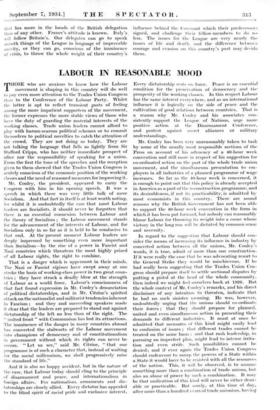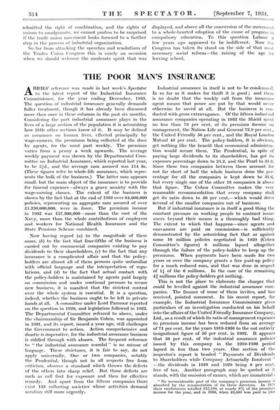LABOUR IN REASONABLE MOOD
THOSE who are anxious to know how the Labour movement is shaping in this country will do well to pay even more attention to the Trades Union Congress than to the Conference of the Labour Party. Whilst the latter is apt to reflect transient gusts of feeling among the more impatient supporters of the movement, the former expresses the more stable views of those who have the duty of guarding the material interests of the working classes. Trade union leaders cannot afford to play with harum-scarum political schemes or to commit themselves to political novelties to catch the attention of the crowd. They are not doing so today. They are not talking the language that falls so lightly from Sir Stafford Cripps, who has neither immediate prospect of office nor the responsibility of speaking for a union. From the first the tone of the speeches and the reception given to them showed that the Trades Union Congress is acutely conscious of the economic position of the working classes and the need of reasoned measures for improving it.
Mr. Conley, the president, appeared to carry the Congress with him in his opening speech. It was a speech in which there was very little talk of mere Socialism. And that fact in itself is at least worth noting, for whilst it is undoubtedly the case that most Labour leaders are Socialists, it should never be forgotten that there is no essential connexion between Labour and the theory of Socialism ; the Labour movement stands for the advancement of the interests of Labour, and for Socialism only in so far as it is held to be conducive to that end. At the present moment Labour leaders are deeply impressed by something even more important than Socialism—by the rise of a power in Fascist and Nazi countries which threatens the most highly prized of all Labour rights, the right to combine.
That is a danger which is uppermost in their minds.. The Nazi or Fascist regimes have swept away at one stroke the basis of working-class power in two great coun- tries; they have struck a deadly blow at the strength of Labour as a world force. Labour's consciousness of that fact found expression in Mr. Conley's denunciation of political dictatorships, and in Mr. Citrine's spirited attack on the nationalist and militarist tendencies inherent in Fascism ; and they and succeeding speakers made it clear that the leaders are prepared to stand out against dictatorship of the left no less than of the right. The united front " with Communism has lost its attractions. The imminence of the danger in many countries abroad has converted the stalwarts of the Labour movement into champions of democracy and of constitutionalism in government without which its rights can never be secure. "Let us see," said Mr. Citrine, "that our programme is of such a character that, instead of waiting for the social millennium, we shall progressively raise the standard of life."
And it is also no happy accident, but in the nature of the case, that Labour today should cling to the principle Of disarmament and peace, and internationalism in foreign affairs.. For nationalism, armaments and dic- tatorships are closely allied. Every dictator has appealed to the blind spirit of racial pride and exclusive interest. Every dictatorship rests on force. Peace is an essential condition for the preservation of democracy and the prosperity of the working classes. In this respect Labour has the same interest everywhere, and as an international influence it is logically on the side of peace and the cultivation of good relations between countries. That is a reason why Mr. Conley and his associates con- sistently support the League of Nations, urge more positive action at the Disarmament Conference, and protest against secret alliances or military understandings.
Mr. Conley has been very unreasonably taken to task by some of the usually most responsible sections of the Press on account of his advocacy of a 40-hour week convention and still more in respect of his suggestion for co-ordinated action on the part of the whole trade union movement, and the simultaneous presentation to em- ployers in all industries of a planned programme of wage increases. So far as the 40-hour week is concerned, it is enough to point out that this policy is already accepted in America as a part of the reconstruction programme, and its desirableness, if not its practicability, is admitted by most economists in this country. There are sound reasons why the British Government has not been able to support the 40-hour week convention in the form in which it has been put forward, but nobody can reasonably blame Labour for throwing its weight into a cause whose victory in the long run will be dictated by common sense and necessity.
In regard to the suggestion that Labour should con- sider the means of increasing its influence in industry by concerted action between all the unions, Mr. Conley's words, it is true, admit of more than one construction. If it were really the case that he was advocating resort to the General Strike they would be mischievous. If he had really been suggesting that the Trades Union Con- gress should prepare itself to settle sectional disputes by putting a pistol at the head of the whole community, then indeed we might feel ourselves back at 1926. But the whole context of Mr. Conley's remarks, and his direct disclaimer of any intention to threaten, indicate that he had no such sinister meaning. He was, however, undoubtedly urging that the unions should co-ordinate their forces ; that they should prepare for planned, united and even simultaneous action in presenting their demands to different industries. It must at once be admitted that measures of this kind might easily lead to confusion of issues ; that different trades cannot be treated on the same basis ; and that rash leadership, in pursuing an imperfect plan, might lead to intense irrita- tion and even strife. Such possibilities cannot be denied; and if ever again the Trades Union Congress should endeavour to usurp the powers of a State within a State it would have to be resisted with all the resources of the nation. This, it will be observed, is to assume something more than a combination of trade unions, but also an abuse of power by such a combination. It may be that unification of this kind will never be either desir- able or practicable. But surely, at this time of day, after more than a hundred years of trade unionism, having admitted the right of combination, and the rights of unions to amalgamate, we cannot profess to be surprised if the trade union movement looks forward to a further step in the process of industrial organization.
So far from attacking the speeches and resolutions of the Trades Union Congress this is surely an occasion when we should welcome the moderate spirit that was displayed, and above all the conversion of the movement to a whole-hearted adoption of the cause of progress in compulsory education. To this question Labour a few years ago appeared to be indifferent. Now the Congress has taken its stand on the side of that most necessary social reform—the raising of the age for leaving school.







































 Previous page
Previous page